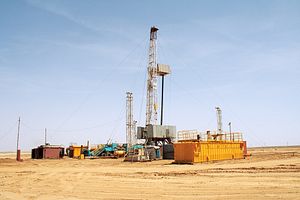It’s no secret that 2014 ended on a poor note for Kazakhstan. Sagging oil prices coupled with an economic crunch in Russia to hammer Astana’s economy. Russian adventurism – and not-so-veiled threats against Astana’s statehood – saw relations between Moscow and Astana reach their post-Soviet nadir. And far from the post-Soviet integration project Kazakhstani President Nursultan Nazarbayev envisioned, the Eurasian Economic Union morphed into another excuse for reasserting Russian hegemony, all to Astana’s detriment.
No, 2014 was not kind to Kazakhstan. But if Astana hoped 2015 may help turn the tide, all signs thus far point to looming disappointment.
Oil prices, of course, show no signs of abating anytime soon, hovering well below Kazakhstan’s breakeven price. And while Astana has demonstrated a bit more economic deftness than Moscow has, its pushes toward diversification and new counter-cyclical economic policies remain, at best, half-measures. Kazakhstan’s not yet fallen into a recession outlook, but the government has cut its projected 2015 economic growth to 1.5 percent, its lowest rate since 2009. Concurrent with the economic anemia comes a recent S&P credit downgrade. The ratings agency dropped Kazakhstan to BBB, with a negative outlook alongside.
As if the price sag weren’t enough, Astana recently learned that its Kashagan oil field – the world’s largest supply discovery since Alaska’s Prudhoe Bay – would only be viable if oil returns to $100 per barrel. Of course, this would require Kashagan to come online in the first place. Considering the project is already a decade behind schedule and tens of billions of dollars over the initial budget, whatever optimism that still surrounds the project is quickly fading.
Likewise, the threat of currency devaluation remains ever-present. While Kazakhstan may not see the shock, 19-percent devaluation it experienced a year ago, consensus has formed that another round of devaluation is due, if not overdue. Recent dollarization trends may only augment the need for another round of devaluation.
Of course, these economic doldrums don’t come in a geopolitical vacuum. This year has shown little sign of Russia’s revanchism abating; if anything, Moscow’s neo-imperialism has only surged in this new year. A wary Kazakhstan recently announced training exercises with U.S. forces, and continues high-level pronouncements supporting Ukraine’s territorial integrity. (These calls, presumably, don’t extend to the Crimean occupation, which Kazakhstan recognized in early 2014.)
Friction with Russia shows no signs of slowing in the economic sphere, either. As the Eurasian Economic Union continues to act as a hamper on Kazakhstan’s sluggish economic outlook, recent voices have begun calling for the reinstatement of customs checkpoints along the Kazakhstani-Russian border – effectively negating any purpose of a customs union in the first place. The protectionist measure hasn’t yet taken form, but has received support from one of the country’s most Russian-heavy enclaves in Pavlodar. Citing the recent flood of cheap Russian products, the region’s vice-governor offered “to introduce a ban or limit [on] the import from Russia for those goods that domestic producers are capable of supplying in sufficient quantities on their own[.]” This, presumably, casts a wide net.
If and when customs checkpoints return to the border – and if they remain along the Kazakhstani-Kyrgyzstani border, as is presumed – this would see customs checkpoints along nearly every land-border within the Eurasian Union. Indeed, the only land-border that would not see customs checkpoints may well be between Armenia and Nagorno-Karabakh, an unrecognized statelet carved out of Azerbaijan. Not a situation that necessarily illustrates legitimacy.
Flagging oil, currency devaluation, Eurasian Union pointlessness, and a bleak economic outlook: For Kazakhstan, 2015 is shaping up much like 2014.

































